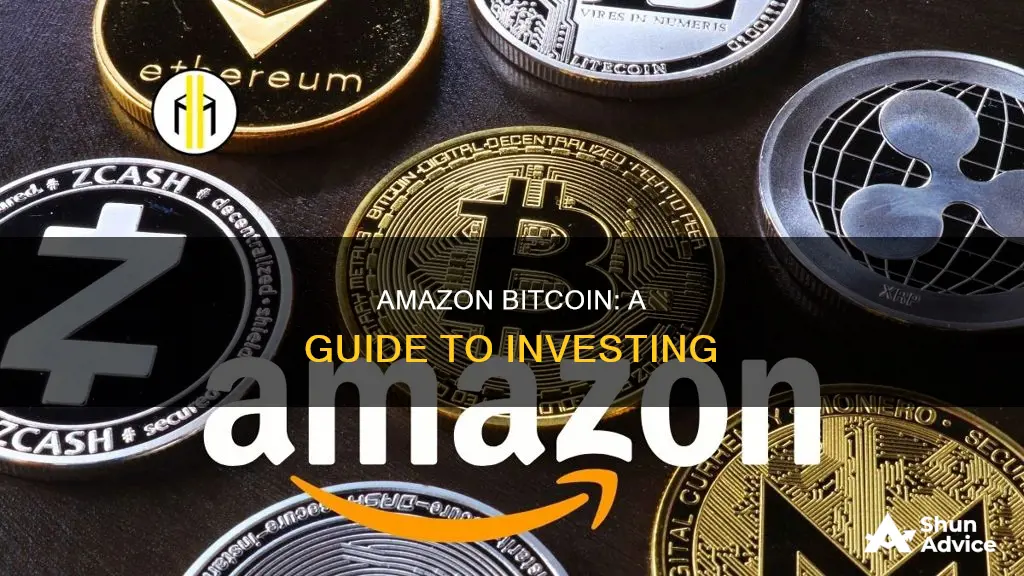
Amazon, one of the most anticipated retailers to adopt Bitcoin, does not currently accept Bitcoin as a payment method. However, there are speculations that the company is preparing to launch its own cryptocurrency or accept Bitcoin as a form of payment in the future. In the meantime, customers can use Bitcoin indirectly to make Amazon purchases by using it to buy prepaid Amazon gift cards online.
| Characteristics | Values |
|---|---|
| Amazon's stance on Bitcoin | Amazon does not accept Bitcoin directly. |
| Amazon's stance on cryptocurrencies | Amazon bought three cryptocurrency-related domain names in 2017. |
| Amazon's stance on its own digital currency | Amazon introduced Amazon Coins in 2013, a virtual currency for purchasing eligible apps, games, and in-app items from the Amazon Appstore. |
| Amazon's stance on blockchain | Amazon Web Services (AWS) supports 25% of all Ethereum global workloads. |
| Ways to shop on Amazon using Bitcoin | Purse.io, Bitrefill, Fold, and Moon. |
What You'll Learn

Amazon's potential cryptocurrency plans
Amazon has denied plans to accept Bitcoin as a payment option, but the company has expressed interest in the space and is exploring what this could look like for customers on the platform. In 2021, Amazon posted a job listing for a Digital Currency and Blockchain Product Lead, suggesting that the company is thinking about adding a "Pay with Bitcoin" option to its shopping cart.
In 2013, Amazon introduced Amazon Coins as its native token with a listed value of $0.01. Amazon Coins are currently only available in the USA, UK, Germany, France, Italy, Spain, Japan, and Australia. These tokens work similarly to digital gift cards for end consumers, but Amazon benefits from financial incentives attached to their mass adoption, such as saving millions in credit card processing fees and reducing exposure to credit card chargebacks.
There are also rumours that Amazon could start accepting Bitcoin as a payment method and other popular digital currencies in the future. Amazon Web Services (AWS) already supports 25% of all Ethereum global workloads, so it is speculated that Amazon could apply the same notion of circumventing intermediaries for its blockchain clients to its own intermediaries (such as banks and insurance companies) for its native token or trusted blockchain ecosystem.
- By investing directly in AMZN shares, any potential success of Amazon Coin will reflect in the share price.
- Tokenized AMZN shares: Tokenized shares denote the holding of a digital asset, which represents 1/10,000th of an AMZN share, making it possible to invest minimal amounts. These are available on micro equity exchanges like Algorand’s MESE.
TD Ameritrade: Buying Bitcoin Investment Trust Guide
You may want to see also

How to buy on Amazon with Bitcoin
Although Amazon does not directly accept Bitcoin as a form of payment, there are several methods you can use to make purchases on Amazon using Bitcoin.
Gift Cards
One way to use Bitcoin to shop on Amazon is by purchasing an Amazon gift card from a service that accepts Bitcoin. Services such as BitPay, Bitrefill, and SpectroCoin allow you to exchange Bitcoin for Amazon gift cards. You can then use these gift cards to make purchases on Amazon.
Third-Party Services
Additionally, there are third-party services that facilitate shopping on Amazon using Bitcoin. Purse.io, for example, connects shoppers who want to pay with Bitcoin on Amazon, with people who want to trade their Amazon gift cards for Bitcoin. Another option is to use a service like Crypto.com, which allows you to fund a debit card with your crypto holdings. You can then use this debit card to make purchases on Amazon.
Workarounds
Finally, there are some workarounds you can use to indirectly purchase items from Amazon with Bitcoin. For example, you can cash out your Bitcoin to a bank account or through an investment app, and then use that money to make purchases on Amazon.
While Amazon has not yet accepted Bitcoin directly, these methods provide a way for users to make purchases on the platform using their Bitcoin holdings.
Dash Coin Investment Guide for Indians
You may want to see also

Amazon's digital currency project in Mexico
Amazon has been working on a new digital currency project in Mexico, according to the company's job postings. The project, known as "Digital and Emerging Payments" (DEP), will be a new payment product that allows customers to convert their cash into digital currency, which they can then use to shop for goods and services like Prime Video.
Amazon's grip on the internet economy appears to be extending to currency, with the e-commerce giant preparing to launch this "digital currency" project in Mexico. The project is yet to be officially announced, but it has been hinted at in a series of job postings by the company. The postings suggest that the project is aimed at keeping Prime customers engaged with Amazon's platform and that it will first be rolled out in Mexico, with other emerging markets to follow.
Amazon is currently building a tech team to enable this new digital currency service. The company is hiring software development engineers at all levels to staff up for the launch, with a particular focus on candidates with a Bachelor's degree in computer science or equivalent and over three years of experience managing the delivery of distributed software systems.
The DEP project will allow customers to convert their cash into digital currency, which they can then use to shop for goods and services online. This feature will initially be available in Mexico, with the potential to expand to other emerging markets. Amazon has not yet responded to requests for comment on the project.
Coinbase: A Long-Term Investment or Short-Lived Hype?
You may want to see also

How to buy Bitcoin: a beginner's guide
Step 1: Get a Bitcoin Wallet
Before you buy Bitcoin, you need somewhere to put it. This is the purpose of a Bitcoin wallet. A Bitcoin wallet is a piece of software that helps you manage your Bitcoin, allowing you to send, receive, and store your Bitcoin.
There are several types of Bitcoin wallets, including:
- Non-custodial wallets, where you are the sole owner of your Bitcoin, and the coins are linked to and can only be accessed via a specific device, such as a laptop or phone.
- Third-party/custodial wallets, where a company or exchange controls your Bitcoin on your behalf. These are often easier to set up and access from anywhere but are more prone to hacking.
- Multi-signature wallets, which require the approval of a preset number of owners to access the coins inside.
- Paper and physical wallets, where your Bitcoin is stored on physical items such as flash drives, dedicated hardware wallets, or even paper.
Step 2: Locate Your Bitcoin Address
Your Bitcoin address is a string of letters and numbers that starts with a "1", "3", or "bc1." It can be found in your Bitcoin wallet and is where people can send you Bitcoin.
Step 3: Choose an Exchange
There are several ways to buy Bitcoin, including through a cryptocurrency exchange, a traditional stockbroker, a money transfer app, or a Bitcoin ATM. Here are some options to consider for each method:
Cryptocurrency Exchanges:
- Binance
- EToro
- Gemini
- Kraken
- Coinbase
- Crypto.com
Traditional Stockbrokers:
- Robinhood
- Webull
- TradeStation
- Fidelity
Money Transfer Apps:
- PayPal
- Venmo
- Cash App
Bitcoin ATMs:
CoinATMRadar
Step 4: Choose a Payment Method
You can purchase Bitcoin with a variety of payment methods, including credit/debit cards, wire transfers, and cash. Here are some things to keep in mind:
- Using a credit card to buy Bitcoin can be expensive and may require identity verification.
- With wire transfers, there is no risk of a chargeback, so sellers often prefer this method. However, it can take several days for the transaction to complete.
- Buying with cash can be quick and cheap but may require meeting the seller in person.
Step 5: Make Your Purchase
Once you have chosen an exchange and payment method, you can make your Bitcoin purchase. Remember to only invest an amount that you are comfortable losing, as Bitcoin is a risky and volatile asset. After you buy your Bitcoin, be sure to transfer it from the exchange to your personal wallet to ensure its safety.
Additional Tips:
- Dollar-Cost Averaging (DCA): This strategy involves buying a fixed amount of Bitcoin at regular intervals, regardless of the price. This helps to average out the fluctuations in the exchange rate.
- When to Buy: There is no perfect time to buy Bitcoin. If you are looking for short-term gains, you may want to try to time the market. If you believe in the long-term potential of Bitcoin, any time can be a good time to buy.
- How Much to Buy: Only invest an amount that you can afford to lose. A common rule of thumb is to invest no more than 10% of your portfolio in risky assets like Bitcoin.
Invest in Bitcoin: Avoid Startup Fees and Get Started
You may want to see also

Bitcoin's future as a mainstream currency
One of the main arguments against Bitcoin becoming a mainstream currency is its volatility. Bitcoin is subject to unpredictable cycles of inflation and deflation, which can make it challenging for consumers to trust it as a stable means of exchange. Its value can double over six months and then fall by 50% in the next 30 days, as seen in 2012 and 2013. This volatility can be a deterrent for consumers who need stability in their daily-use currency.
Another challenge for Bitcoin to become mainstream is gaining the trust of consumers, businesses, and governments. Unlike traditional banks, Bitcoin does not offer safeguards such as fraud protection, deposit insurance, or dispute moderation. Without a governing authority, it can be difficult for people to feel confident that their money is safe.
However, despite these challenges, Bitcoin has made significant strides towards mainstream adoption in recent years. With the growing number of cryptocurrency holding services powering digital transactions, it is easier than ever to spend bitcoins. Major retailers and traditional financial institutions are also starting to embrace cryptocurrencies, even if they are somewhat behind. If current trends continue, cryptocurrencies could become part of the mainstream within the next few decades.
Additionally, Bitcoin has flourished as "digital gold," and its biggest impact will likely be in denominating business and trade. Bitcoin is a global, decentralized currency beyond the control or guarantee of any country. It offers a transparent and secure way of conducting financial services, settling large payments, and more.
The future of Bitcoin as a mainstream currency is uncertain, but it is clear that its influence will continue to grow, impacting both other cryptocurrencies and traditional financial services.
BlackRock's Bitcoin Investment: A Giant Step for Crypto
You may want to see also
Frequently asked questions
No, Amazon does not currently accept Bitcoin as a payment method. However, there are several services that allow you to buy Amazon gift cards with Bitcoin, such as Purse.io, Bitrefill, Fold, and Moon.
There have been speculations about Amazon's potential acceptance of Bitcoin as the company has bought cryptocurrency-related domain names and posted job listings related to digital currency and blockchain. However, there is no confirmation, and Amazon has not provided explicit reasons for not accepting Bitcoin.
You can indirectly use Bitcoin to make purchases on Amazon by using cryptocurrency to buy prepaid Amazon gift cards online from gift card hubs like Gyft and BitPay.







